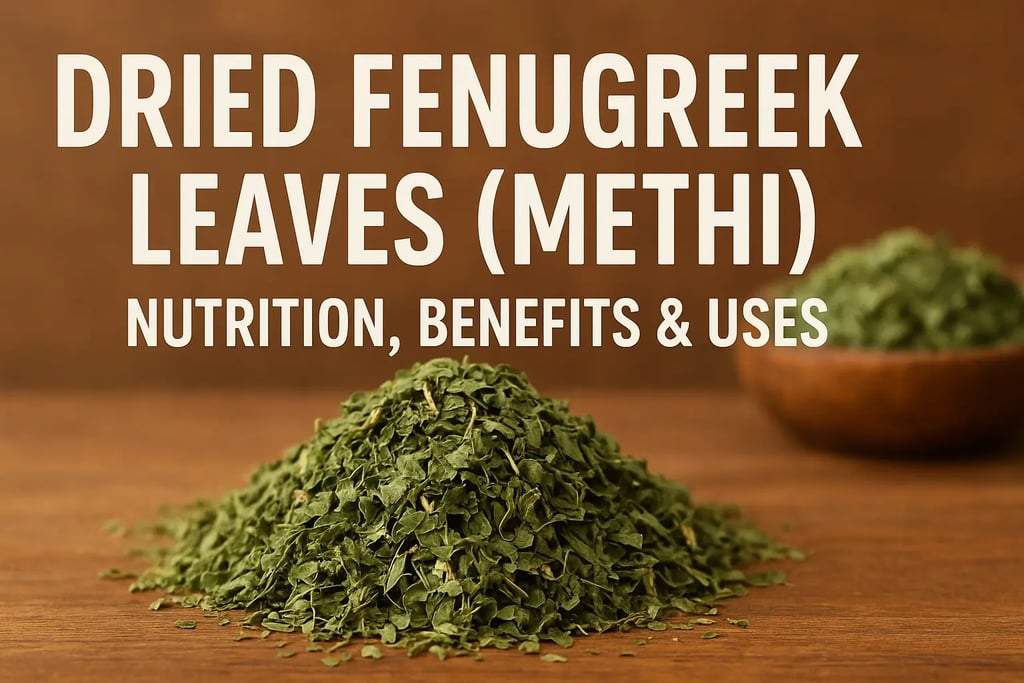Dried Fenugreek Leaves (Methi): Nutrition, Health Benefits & Top Uses
Discover the nutrition, health benefits, and uses of dried fenugreek leaves (methi). Learn how this nutrient-rich herb supports digestion, blood sugar control, heart health, and overall wellness.


Dried Fenugreek Leaves (Methi): Nutrition, Benefits & Uses
Introduction to Dried Fenugreek Leaves
Dried fenugreek leaves, popularly known as methi, are a powerhouse herb used for centuries in cooking and traditional medicine. Scientifically called Trigonella foenum-graecum, fenugreek comes from the Fabaceae family and originates from the Mediterranean region. Over time, it has become an integral part of Indian cuisine and Ayurveda due to its unique aroma, flavor, and therapeutic properties.
For thousands of years, people have used fresh fenugreek leaves, seeds, and dried leaves to enhance the taste of regional dishes. Dried fenugreek leaves, in particular, add a slightly bitter, earthy flavor that elevates curries, dals, and spice blends. In Ayurveda, methi is valued for its digestive, anti-inflammatory, and immunity-boosting qualities.
The drying process involves carefully harvesting and dehydrating fenugreek leaves to retain their nutrient density and characteristic aroma. This method not only increases shelf life but also concentrates essential vitamins and minerals, making dried fenugreek leaves a powerful addition to your daily diet.
This guide will help you understand the nutritional value, health benefits, and best ways to use dried fenugreek leaves so you can incorporate this ancient superfood into modern meals.
Nutritional Profile of Dried Fenugreek Leaves
Dried fenugreek leaves are packed with essential nutrients that support overall health. Below is a breakdown of the key vitamins and minerals they provide:
1. Vitamin C
A serving of dried fenugreek leaves contains about 30.57 mg of Vitamin C, making it excellent for boosting immunity, improving skin health, and enhancing iron absorption from plant-based foods.
2. Vitamin A
Rich in antioxidants, dried methi provides approximately 8010 IU of Vitamin A, which is vital for healthy vision, strong immunity, and proper cell growth.
3. Calcium
With around 177 mg of calcium per serving, dried fenugreek leaves promote stronger bones, muscle function, and nerve signaling—similar to calcium-rich leafy greens like spinach.
4. Iron
One of the most impressive nutrients in dried fenugreek leaves is iron, offering nearly 33 mg per serving. This makes methi an excellent dietary source for vegetarians, women, and individuals at risk of iron deficiency.
5. Magnesium
Dried methi contains around 52 mg of magnesium, a mineral essential for energy production, nerve function, and more than 300 biochemical reactions in the body.
Compared to many common herbs and spices, dried fenugreek leaves deliver a superior nutrient profile—especially in Vitamin C, calcium, and iron—making them a valuable addition to any balanced diet.
Health Benefits of Dried Fenugreek Leaves
Including dried fenugreek leaves in your meals can significantly boost your health. Here are the top benefits:
1. Improves Digestion
Dried methi contains soluble fiber that:
Supports healthy digestion
Prevents constipation
Promotes smoother bowel movements
People experiencing frequent indigestion may find notable relief by adding methi to their diet.
2. Helps Regulate Blood Sugar
Fenugreek contains compounds like 4-hydroxyisoleucine, which:
Improves insulin sensitivity
Enhances insulin secretion
Helps stabilize blood glucose levels
This makes dried fenugreek leaves beneficial for individuals managing diabetes or at risk of unstable blood sugar.
3. Supports Heart Health
The natural fiber and antioxidant content in methi helps:
Lower LDL (bad) cholesterol
Reduce inflammation
Support cardiovascular function
Research indicates that regular consumption of fenugreek can reduce cholesterol buildup and support long-term heart health.
4. Reduces Inflammation
Thanks to its anti-inflammatory properties, dried fenugreek leaves may help reduce chronic inflammation linked to various health issues, including joint pain and metabolic disorders.
How to Use Dried Fenugreek Leaves in Your Diet
Dried fenugreek leaves are incredibly versatile and easy to incorporate into everyday meals. Here are some simple ways to use them:
Add to curries and dals for depth of flavor
Sprinkle into soups and stews for a nutrient boost
Mix into homemade spice blends like garam masala
Prepare herbal fenugreek tea for digestion support
Use as garnish in roti, paratha, sabzi, and lentil dishes
With their rich nutrient profile and health benefits, dried fenugreek leaves are an excellent choice for anyone looking to support overall wellness through natural, flavorful ingredients.
